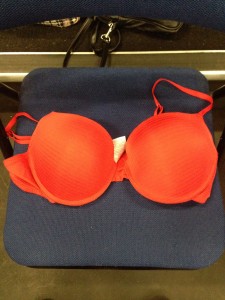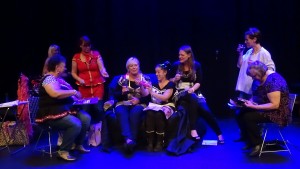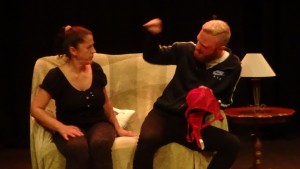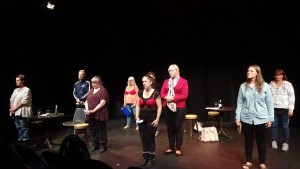Seeing Red – Melodramatics (part 1)
Post by Jenny Hughes
‘Can everyone check they have their red bra please?’ – was the repeated appeal from director Lauren Ash in the final hours of the rehearsal of Seeing Red, an original drama exploring experiences of domestic violence, performed in the Bill Naughton Studio at the Octagon on 21st and 22nd September. Seeing Red was created and performed by Melodramatics, a women’s theatre group supported by the Octagon Theatre and Bolton at Home partnership, based in the New Bury area, that have been working together for about 18 months. This was a collectively devised piece inspired by experiences shared by many of the group members. There was no fixed script – the women decided they would rather have the freedom to improvise in performance rather than the stress of learning lines – and they performed from a well-rehearsed outline for each scene and a well-worked and clear emotional and narrative arc. I witnessed some rehearsals early in the process – establishing the ‘real life’ quality of this emotional and narrative arc was a significant part of the process – as explained in a post on the rehearsal process – ‘Seeing Red – Melodramatics (part 2).
For background, have a watch of a a short film of the Octagon Theatre and Bolton at Home partnership here – you’ll see some of the Melodramatics women talking about the their work later in the film. Also, watch Dawn Obe-Yates give some background to the work of the group here, and Roddy Gauld on the Octagon Theatre/Bolton at Home partnership here. And – watch out for clips of the group reflecting on the performance, and images and clips from the performance itself, available on the Poor Theatres database soon.
The day of the performance was enjoyable to be part of – there was a generosity of spirit throughout the day, within the group and from the theatre staff. There were also jokes about sex toys (the first scene of the play takes place in an Ann Summers Party), a liberal amount of mickey-taking – especially of Gary Hanks, a professional actor supporting the play and the only man present, much sorting out of props – fake £5 notes, costumes for the party, plastic plates, settee cushions, glasses of wine and bottles of beer. There were interruptions for appointments and quick trips home to feed cats, dogs, kids, and there were takeaway pizzas, hastily refreshed hairdos – and, increasingly, as the time for the opening approached, a tangible sense of rising hysteria, triggering a fair amount of corpsing when rehearsing scenes in the final run through.
Around 100 people gathered for the performance – friends, family, supporters, staff from Bolton at Home and a good range of representatives from local agencies that offer support to those coping with domestic violence. The performance was a brilliant success – the women kept their nerve, the scenes and at times complex scene transitions went smoothly, every part was powerfully performed, and the feedback from the audience was extremely positive – ‘you should keep doing this play and get as many people as possible to see it’; ‘it made my hair stand on end’.
Seeing Red told the story of a moment in time in the relationship between ‘Lindsay’ and her partner, ‘Phil’. We witnessed Phil’s increasing control over Lindsay, and her gradual isolation from loved ones and friends, brought about by seemingly small demands (to leave the party early, and to order the bra she likes in white rather than red), that become more and more exploitative and demeaning – Phil gives her a list of jobs to do around the house, denigrates her mum and best friend – and eventually, this leads to scenes of verbal, emotional and physical violence. The scene of physical violence was horrifying – it began with the pair relaxing on the sofa, with Phil praising Lindsay for having done all her jobs and cooking a nice meal. He then discovers the newly purchased red bra (his instruction to change the order to a white bra had not been obeyed – there had been a mistake in the order), and he accuses Lindsay of cheating on him. This leads to the attack, shown as three frozen tableaux in red light, with a sound effect of breaking glass. There was an eerie silence afterwards – the two actors silently got up and walked off on opposite sides of the stage and in the half light, other members of the cast came on to set the stage for the final scene – a pub quiz, with a round of questions about domestic violence. I found the transition – the resetting of the stage – oddly effecting, almost calming. The cast picked up props that had been thrown to the floor, re-established order, put the world back together after the destruction of the scene before …
This was a powerful piece of drama – I loved the ‘forensic’ form of naturalism it employed to get underneath the realities of domestic violence – see ‘Seeing Red – Melodramatics (part 2) – and the women were absolutely brilliant. There are some fantastically strong characters in this group, and this made for a performance that was brave, moving, incredibly authentic and in places very funny. The comments from the audience that followed during the Q&A showed that I was not alone in my opinion – many in the audience said how moved and inspired they felt by the performance. The Q&A was supported by a Detective Sergeant from Bolton police’s domestic violence unit, who explained the work of the unit, and a representative of Paws for Kids, an agency that offers bespoke services for people in the North West (England) escaping or recovering from domestic violence. The effectiveness of the play – its attentiveness to depicting the ‘truth’ of each scenario for the characters – was evident in the frequent references made by both speakers to incidents in the play to illustrate their points and in response to questions from the audience – to explain why women and men might choose to stay in situations of abuse, for example, and how to support someone you might be concerned about. The cast distributed leaflets from local agencies supporting people around issues of domestic violence – including Paws for Kids and Fortalice, which runs a refuge, training programmes and offer a range of services for domestic abuse survivors – placing these on the seats for audiences to take away. Importantly, those contributing to the discussion from domestic violence agencies drew attention to the damaging effect of funding cuts, and the worrying turn to using untrained volunteers to run essential support services, replacing experienced staff who have decades of hard-won expertise in the complex and sensitive task of supporting families to deal with domestic violence.
For more information on the Octagon Theatre and Bolton at Home partnership, see previous blog posts (A unique partnership, Humanising our public spaces, Humanising our public spaces – part 2). Also, see the full versions of the interviews with Dawn Obe-Yates (Percent for Art Officer, Bolton at Home), Lisa O’Neill-Rogan (formerly Learning and Participation Manager, Octagon Theatre) and Roddy Gauld (Chief Executive, Octagon Theatre) on the Poor Theatres map and database. Interviews with the Melodramatics group, Jon Lord (Chief Executive, Bolton at Home) and Elizabeth Newman (Artistic Director, Octagon Theatre) will be added soon.
P.S. Sisters Uncut are a feminist group taking direct action against cuts to domestic violence services, drawing attention to the same issues raised by audience members.
More broadly, but also a campaign run by women and well worth supporting – Focus E15 are campaigning for affordable housing, and against evictions and social cleansing in London.





Comments are closed
Sorry, but you cannot leave a comment for this post.